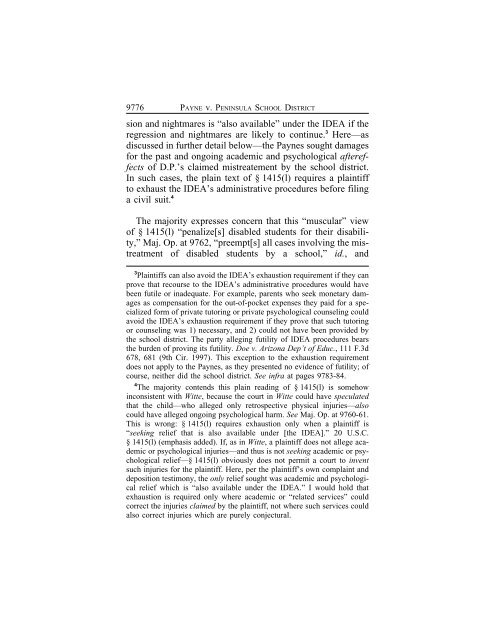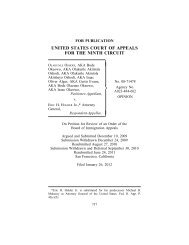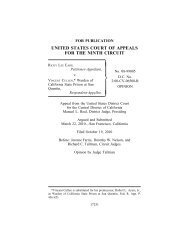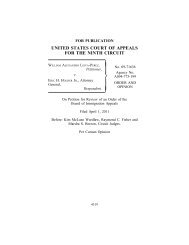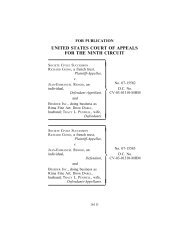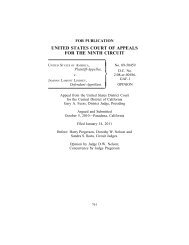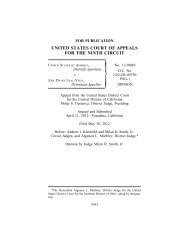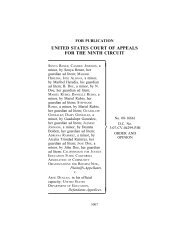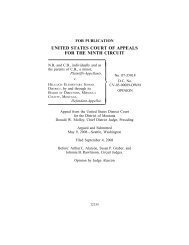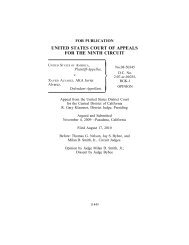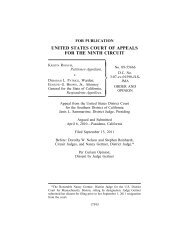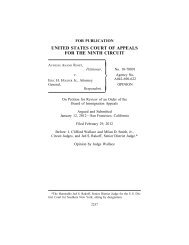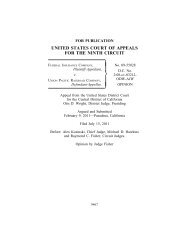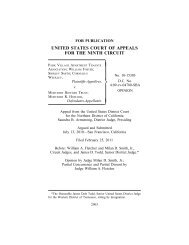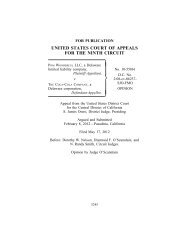UNITED STATES COURT OF APPEALS FOR THE NINTH CIRCUIT
UNITED STATES COURT OF APPEALS FOR THE NINTH CIRCUIT
UNITED STATES COURT OF APPEALS FOR THE NINTH CIRCUIT
You also want an ePaper? Increase the reach of your titles
YUMPU automatically turns print PDFs into web optimized ePapers that Google loves.
9776 PAYNE v. PENINSULA SCHOOL DISTRICT<br />
sion and nightmares is “also available” under the IDEA if the<br />
regression and nightmares are likely to continue. 3 Here—as<br />
discussed in further detail below—the Paynes sought damages<br />
for the past and ongoing academic and psychological aftereffects<br />
of D.P.’s claimed mistreatement by the school district.<br />
In such cases, the plain text of § 1415(l) requires a plaintiff<br />
to exhaust the IDEA’s administrative procedures before filing<br />
a civil suit. 4<br />
The majority expresses concern that this “muscular” view<br />
of § 1415(l) “penalize[s] disabled students for their disability,”<br />
Maj. Op. at 9762, “preempt[s] all cases involving the mistreatment<br />
of disabled students by a school,” id., and<br />
3 Plaintiffs can also avoid the IDEA’s exhaustion requirement if they can<br />
prove that recourse to the IDEA’s administrative procedures would have<br />
been futile or inadequate. For example, parents who seek monetary damages<br />
as compensation for the out-of-pocket expenses they paid for a specialized<br />
form of private tutoring or private psychological counseling could<br />
avoid the IDEA’s exhaustion requirement if they prove that such tutoring<br />
or counseling was 1) necessary, and 2) could not have been provided by<br />
the school district. The party alleging futility of IDEA procedures bears<br />
the burden of proving its futility. Doe v. Arizona Dep’t of Educ., 111 F.3d<br />
678, 681 (9th Cir. 1997). This exception to the exhaustion requirement<br />
does not apply to the Paynes, as they presented no evidence of futility; of<br />
course, neither did the school district. See infra at pages 9783-84.<br />
4 The majority contends this plain reading of § 1415(l) is somehow<br />
inconsistent with Witte, because the court in Witte could have speculated<br />
that the child—who alleged only retrospective physical injuries—also<br />
could have alleged ongoing psychological harm. See Maj. Op. at 9760-61.<br />
This is wrong: § 1415(l) requires exhaustion only when a plaintiff is<br />
“seeking relief that is also available under [the IDEA].” 20 U.S.C.<br />
§ 1415(l) (emphasis added). If, as in Witte, a plaintiff does not allege academic<br />
or psychological injuries—and thus is not seeking academic or psychological<br />
relief—§ 1415(l) obviously does not permit a court to invent<br />
such injuries for the plaintiff. Here, per the plaintiff’s own complaint and<br />
deposition testimony, the only relief sought was academic and psychological<br />
relief which is “also available under the IDEA.” I would hold that<br />
exhaustion is required only where academic or “related services” could<br />
correct the injuries claimed by the plaintiff, not where such services could<br />
also correct injuries which are purely conjectural.


